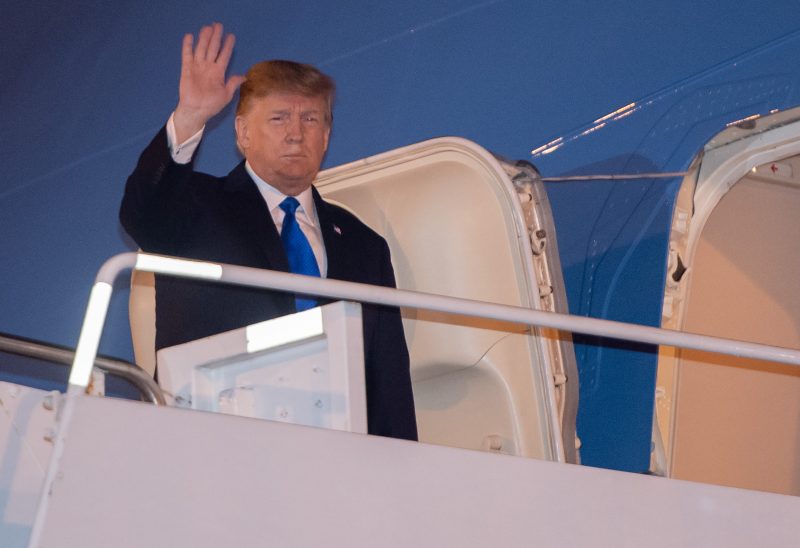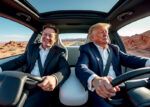With summit and beyond, Trump finds new stride on foreign policy
US President Donald Trump disembarks from Air Force One in Hanoi ahead of his summit with North Korean leader Kim Jong Un (Saul LOEB)
Washington (AFP) – Huddling anew with North Korea’s reclusive leader, rallying to depose Venezuela’s president and pulling back US troops from Syria, Donald Trump is finding a new stride on the world stage.
After two years of fuming against what he sees as a deep state out to constrain him, the real estate mogul turned president enters the halfway point of his term with his stamp increasingly evident on US foreign policy.
He is seeing Kim Jong Un in Vietnam for a follow-up to their historic first summit last year, a meeting avidly sought by a smitten Trump who insists he has forged “great chemistry” to reach a deal with the young strongman.
While calmer observers note that North Korea’s nuclear program remains intact, there is no question that Trump has torn up the playbook on diplomacy with the reclusive adversary by seeking top-level, face-to-face negotiations after decades of the sluggish talks among diplomats.
Trump has also largely had his way on Syria where he is pulling out US forces despite deep misgivings in the establishment and his defense secretary’s resignation, although the White House last week agreed to leave a bare-bones force of 200 troops.
And on Venezuela, Trump has found himself in the unusual situation of enjoying a broad alliance that includes Latin American and European powers that share his goal of pushing out leftist President Nicolas Maduro, who presides over a crumbling economy that has sent millions fleeing.
– ‘Untethering America’ –
Aaron David Miller, a veteran US negotiator in the Middle East who advised six secretaries of state, said that Trump’s first two years amounted to “diplomatic and political malpractice” by rejecting a traditional foreign policy process that brings clarity to decisions.
But Miller credited Trump with trying to find a better way to reduce the threat of nuclear-armed North Korea and for taking a clear-eyed view of the US mission in conflicts such as Afghanistan, Syria and Libya.
“He is untethering America, in my judgment, from unsustainable and unwinnable wars and from the notion that the deployment of large numbers of ground forces can actually repair these Humpty Dumptys that are broken to the extent that, without local ownership and leadership, there isn’t a chance to produce the kind of stable, let alone democratic, countries” sought by the United States, hs said.
Trump nonetheless remains deeply isolated on major international issues, with European allies roundly rejecting his calls to join unilateral sanctions on Iran and propping up a denuclearization accord negotiated under former president Barack Obama.
Allies are also deeply uneasy over Trump’s “America First” approach on defense, including his questioning of NATO’s value, and Trump has completely isolated the United States by rejecting the Paris accord on fighting climate change.
– Welcome respite from Washington –
Miller said it was never likely that Trump, “given his ego and persona,” would not have wanted to inject himself in foreign policy, which he sees as a “force multiplier of the domestic stage.”
American presidents have a long history of devoting themselves to foreign policy despite having little previous experience. But the focus often comes late in their terms as they seek enduring legacies, such as Bill Clinton in pursuing a Middle East peace deal or George W. Bush in a previous push on North Korea.
For Trump, the world stage — including made-for-television handshakes with Kim — offers a welcome respite as he faces an onslaught of pressure at home.
Washington is waiting with baited breath for a report of special counsel Robert Mueller, who has already brought charges against top Trump campaign officials related to alleged collusion with Russia in the 2016 election.
“There are major limits on what he can achieve on domestic issues, especially with the Democrats now controling the House,” said Jordan Tama, an associate professor at American University who studies foreign policy decision-making.
“Foreign policy is an area where he has a lot more leeway because the president can meet with foreign leaders basically without constraints from Congress,” he said.
In his “America First” policy shared with national security adviser John Bolton, Trump bristles at checks on US power including through international institutions and has unapologetically supported allies with tarnished human rights records including Saudi Crown Prince Mohammed bin Salman and Egyptian President Abdel Fattal al-Sisi.
Tama, who advised Obama’s 2008 campaign, said that Venezuela — where allies have broadly joined the US stance that Maduro must go, even if they reject a military solution — showed the possibilities if the president more consistently pursued human rights.
“The Maduro case shows that when the United States stands on the side of human rights and democracy, it can be aligned with other countries that share those values,” Tama said.
Disclaimer: This story is published from a syndicated feed. Siliconeer does not assume any liability for the above story. Validity of the above story is for 7 Days from original date of publishing. Content copyright AFP.


